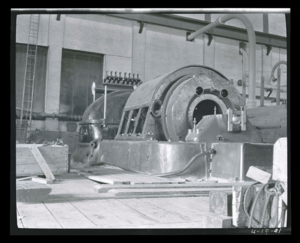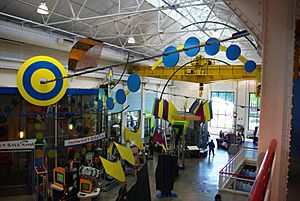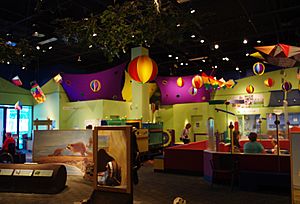Oregon Museum of Science and Industry facts for kids
 |
|
| Lua error in Module:Location_map at line 420: attempt to index field 'wikibase' (a nil value). | |
| Established | November 5th, 1944 |
|---|---|
| Location | Portland, Oregon, U.S. |
| Type | private: science, industry |
| Visitors | 778,457 (2002) |
| Public transit access | |
The Oregon Museum of Science and Industry (often called OMSI, pronounced OM-zee) is a super cool science and technology museum in Portland, Oregon, USA. It has lots of fun, hands-on exhibits about science, nature, and technology. You can also explore a huge movie theater, a planetarium for stargazing, and special halls with changing exhibits from all over the world.
Contents
- OMSI's Journey: A Look at Its History
- Explore the Exhibits: What You Can See and Do
- Dive into History: The USS Blueback Submarine
- Featured Exhibit Hall: Discover Something New
- Turbine Hall: Engineering, Physics, and Space
- Life Sciences Hall: Discover Biology
- Earth Science Hall: Explore Our Planet
- Science Playground: Fun for Little Explorers
- Harry C. Kendall Planetarium: Journey to the Stars
- Best Buy Teen Tech Center: Create with Technology
- Theory Eatery: Food with a View
- Auditoriums: Shows and Events
- Educational Outreach: Science Beyond the Museum
- Supporting OMSI: Volunteers and Funding
- See also
OMSI's Journey: A Look at Its History
OMSI's story began way back in 1903! A man named Colonel L. L. Hawkins started collecting interesting items. He displayed them in the hallways of Portland City Hall.
By 1936, the collection had grown to about 12,000 items. They had to be moved and stored in different places around the city.
Starting the Museum (1944-1958)
On November 5, 1944, the Oregon Museum Foundation was created. Their goal was to build a real museum for history, science, and industry. They showed their first collection of natural history objects at the Portland Hotel. Small exhibits popped up around town to get people excited and gather donations.
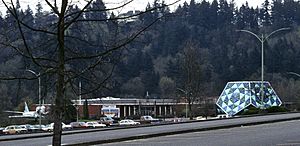
In 1949, a house was given to the museum by Ralph B Lloyd. This house became OMSI's first official home. Within a year, the first public planetarium in the Pacific Northwest opened there. It was in a dome right on the front lawn!
By 1955, 25,000 people visited OMSI each year. The museum needed more space. Volunteers helped build a brand new location at Washington Park. This new, bigger museum opened on August 3, 1958. It even had another planetarium. This site was next to the Portland Zoo, and they shared a parking lot for many years.
Moving to a Bigger Home (1992)
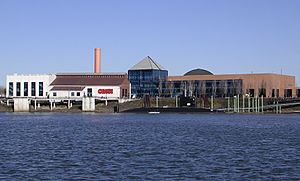
By the mid-1980s, the Washington Park building was too small. It was built for 100,000 visitors, but 600,000 people were coming each year! So, in 1986, OMSI announced it would move again.
The new location would be on the east side of the Willamette River. Portland General Electric donated land that included an old power plant. Fundraising helped pay for the new building. In 1992, OMSI opened at its current, much larger location. The old power plant's turbine building was used in the new design. A huge 330-seat OMNIMAX theater and a 200-seat planetarium were also built.
OMSI Today: What's New?
In 2004, the Turbine Hall got a makeover. New areas were added, like the Inventors Ballroom. There was also a new bridge connecting exhibits.
OMSI has continued to grow and change. In 2013, the OMNIMAX dome theater was updated. It became the Empirical Theater, a flat-screen movie theater with a screen about four stories tall!
In 2023, plans were approved for a new science, arts, and culture hub in Portland's Central Eastside. This project aims to renovate a 10-block area. It will include new housing and public green spaces.
Explore the Exhibits: What You Can See and Do
OMSI has five special exhibit halls, a planetarium, and even a real submarine!
Dive into History: The USS Blueback Submarine
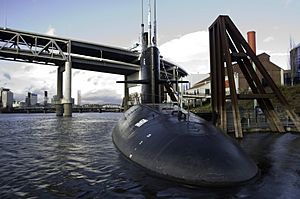
You can actually explore a real submarine at OMSI! The USS Blueback (SS-581) was bought by OMSI in 1994. This submarine was even in the 1990 movie The Hunt for Red October. It's now docked next to the museum.
The Blueback opened for tours on May 15, 1994. It's even listed on the National Register of Historic Places. You can take guided tours and even have sleepovers on the submarine!
Featured Exhibit Hall: Discover Something New
This hall is for special exhibits that change often. Some are created by OMSI, and others come from museums worldwide. Past exhibits have included "A T-rex named Sue" and "The Science Behind Pixar." In 2015, OMSI hosted "GUITAR: The Instrument That Rocked the World."
| Start date | End date | Exhibit | Links | References/notes |
|---|---|---|---|---|
| March 1, 1997 | September 1, 1997 | Giants of the Gobi | ||
| Winter 2001 | Spring 2001 | Grossology | Website | |
| September 2001 | January 2002 | A T-rex named Sue | Website | |
| June 7, 2007 | October 7, 2007 | Gunther von Hagens' Body Worlds 3 | Website | |
| May 2009 | September 2009 | CSI: The Experience | Website | |
| December 2009 | January 2011 | Samson the Colossal T. Rex Discovery | ||
| January 30, 2010 | May 31, 2010 | Space: A Journey to Our Future | Website | |
| July 2, 2011 | September 18, 2011 | Game On 2.0 | Website | |
| September 2012 | January 6, 2013 | Grossology | Website | |
| September 2015 | January 10, 2016 | GUITAR: The Instrument That Rocked The World | Website | |
| October 2, 2015 | January 3, 2016 | Genome: Unlocking Life's Code | Website | |
| February 13, 2016 | May 8, 2016 | Game Masters | Website | |
| June 18, 2016 | January 8, 2017 | Journey to Space | Website | |
| February 18, 2017 | May 29, 2017 | The Art of the Brick | Website | |
| June 24, 2017 | October 22, 2017 | Pompeii | ||
| November 18, 2017 | February 19, 2018 | Illusion: Nothing Is as It Seems | Website | |
| March 17, 2018 | September 3, 2018 | Robot Revolution | Website | |
| October 6, 2018 | January 27, 2019 | Discovery of King Tut | ||
| February 23, 2019 | September 2, 2019 | The Science Behind Pixar | Website | |
| October 5, 2019 | February 17, 2020 | Christopher Marley's Exquisite Creatures | Website | |
| March 20, 2021 | September 6, 2021 | Dinosaurs Revealed | Website | |
| March 2022 | September 2022 | The World of Leonardo da Vinci | Website | |
| October 8, 2022 | April 9, 2023 | Marvel: Universe of Super Heros | Website | |
| May 13, 2023 | January 28, 2024 | Orcas: Our Shared Future | Website | |
| March 2, 2024 | September 8, 2024 | Tyrannosaurs – Meet the Family | Website |
Turbine Hall: Engineering, Physics, and Space
The Turbine Hall gets its name from a huge, old steam turbine that was once part of a power plant. Here, you'll find exhibits about engineering, physics, chemistry, and space travel.
Innovation Station and Labs
The Innovation Station has hands-on exhibits about technology and inventions. You can also visit labs for physics, chemistry, technology, and even laser holography.
- Chemistry Lab: This was the first hands-on wet chemistry laboratory in the country! You can do experiments to learn about chemical reactions. Themes change weekly, covering topics like the chemistry of toys or crime scene chemistry.
- Physics Lab: Explore a Van de Graaff generator (which makes static electricity!), learn about motion, electricity, and magnets. You can even try out musical instruments.
- Laser/Holography Lab: Watch demonstrations on how to create a hologram.
- Vernier Technology Lab: See how technology affects our lives. You can explore robots, computers, security tech, and communication tools.
Life Sciences Hall: Discover Biology
On the second floor, the Life Sciences Hall teaches you about biology. You can see exhibits about how living things grow and change. There's even an "Age Machine" where you can see what you might look like when you're older!
Life Sciences Laboratory: Meet Live Animals
This lab is home to many live animals, like rats, walking sticks, chameleons, and Madagascar hissing cockroaches. Staff and volunteers lead fun activities, like dissecting owl pellets.
Earth Science Hall: Explore Our Planet
Also on the second floor, the Earth Science Hall focuses on geology.
Watershed and Paleontology Labs
- Watershed Laboratory: Build a model river and watch how erosion works. Learn about the salmon life cycle and see tiny creatures from local waterways under a microscope.
- Paleontology Laboratory: Watch staff and volunteers carefully dig up fossils, like dinosaur bones!
Science Playground: Fun for Little Explorers
This special area is for families with children aged newborn to six years old. It's a safe, enclosed space where little ones can explore science through play. It has a giant sandbox, a water area, and a reading nook.
Animal Secrets and Discovery Lab
- Animal Secrets: Kids can crawl through tree roots, look for animals in a cave, and play in a woodland stream.
- Discovery Laboratory: This lab offers changing experiments and activities, like making "Flubber" or ice cube painting.
Harry C. Kendall Planetarium: Journey to the Stars
In the Harry C. Kendall Planetarium, you can watch amazing astronomy shows and laser light shows every day. It's a great way to learn about space and the stars!
Best Buy Teen Tech Center: Create with Technology
Opened in 2020, the Best Buy Teen Tech Center is a free space for teens. Here, you can explore your ideas and learn new skills using technology. You can try programming, filmmaking, music production, and graphic design.
Theory Eatery: Food with a View
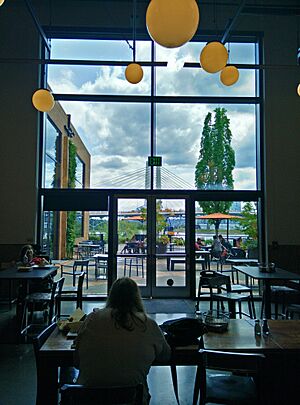
Theory Eatery, or simply Theory, is a restaurant at OMSI. It opened in 2013 and offers American cuisine. It's located right by the Willamette River, with great views of the Tilikum Crossing and Marquam Bridge. The restaurant also hosts science demonstrations and events.
Auditoriums: Shows and Events
OMSI has a huge movie theater (the Empirical Theater) and a large auditorium. The auditorium hosts annual events like science fairs, including OHSU's Brain Awareness and the Reptile and Amphibian Show. It's also used for private events.
Educational Outreach: Science Beyond the Museum
OMSI has one of the biggest science museum outreach programs in the country. They bring science presentations to schools and offer summer science camps. They also run outdoor school programs on the Oregon Coast and at the John Day Fossil Beds National Monument.
OMSI is a popular place for school field trips for students from kindergarten to 12th grade. They also host "star parties" in local parks to teach the public about astronomy during events like meteor showers.
OMSI also helps science professionals improve their communication skills. They offer fellowships where scientists learn to share their work with museum visitors through hands-on demonstrations.
Supporting OMSI: Volunteers and Funding
OMSI is a non-profit organization. It gets money from ticket sales, memberships, donations, grants, and fundraising events. The biggest fundraising event each year is the OMSI Gala.
Many people help OMSI as volunteers. They greet visitors, help with customer service, and lead exhibit demonstrations. Volunteers include high school and college students, as well as other community members. After 50 hours of helping, volunteers get a free one-year museum membership!
The Teen Science Alliance is a special program for young volunteers. Teens learn communication and customer service skills. They also create their own science demonstrations to share with the public.
See also
- California Museum of Science and Industry, Los Angeles
- Museum of Science and Industry (Chicago)
- Museum of Science & Industry (Tampa), Florida
- Portland Winter Light Festival
 | Mary Eliza Mahoney |
 | Susie King Taylor |
 | Ida Gray |
 | Eliza Ann Grier |


